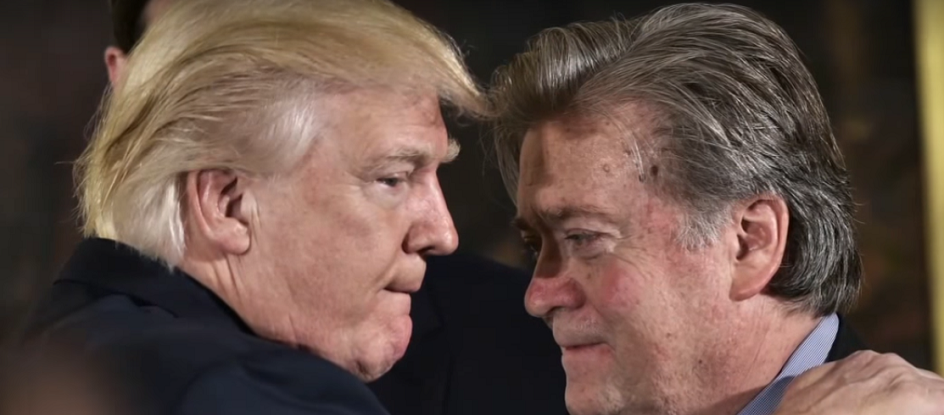According to the New York Times, Trump’s chief strategist Steve Bannon admires radical Italian philosopher Julius Evola. An examination of Bannon’s statements shows the opposite

The ground is shaking as the result of Jason Horowitz’s “scoop”. The very embodiment of the daring investigative reporter, Horowitz has exposed the true face of the Trump administration: Trump’s chief strategist, Steve Bannon, cited the radical Italian thinker Julius Evola, who was admired by Mussolini and felt close to the Nazi SS.
This revelation obviously made many waves, and many liberal and progressive media outlets gleefully published the scoop. The progressive website Raw Story ran the headline: “Meet the scary Italian fascist thinker approvingly cited by Steve Bannon.” The Forward went even further with: “Meet The Philosopher Who’s A Favorite of Steve Bannon and Mussolini.” The English edition of Haaretz proclaimed breathlessly: “Steve Bannon Cited WWII-era Nazi Writer as Ideological Influence.”
The questions that beg to be answered are: Who is Julius Evola, and why haven’t we heard of him?
Well, Evola was a particularly extreme thinker: He was a racist and utterly anti-democratic, and, to a certain extent his writings did inspire the atrocities Mussolini committed in the last stages of his rule. Evola promoted a complex and contradiction-riven philosophy that rejected capitalist-democratic modernity and replaced it with an imagined past—usually, the pagan one prior to “Christian corruption.” This thinking enjoyed some attention in its time and has, thankfully, been forgotten, aside from radical circles in the extreme right and left.
(It’s worth noting that despite Evola’s relationship with Mussolini and his affinity for the Nazi SS, he was acquitted in his post-war trial, claiming that he was “merely an anti-democratic philosopher, much like Plato.”) Evola died in 1974, noted as “a figure with broad fame in limited circles.” Exit Signor Evola.
Enter Steven Bannon, whom the media has crowned Trump’s “grey cardinal.” Mr. Bannon is very relevant to our lives, and any link to Evola should be disturbing; except for the fact that he never alluded to Evola in his prepared remarks. The New York Times headline is deceptive, and every media outlet that followed its lead was fooled. These sensationalist articles contradict the very raw material made public by Buzzfeed, even while referencing it. The Buzzfeed article contains an unedited transcript of a speech Bannon gave via Skype to a Vatican conference in 2014. The conference covered “human dignity” and the consequences of economic order. In that speech, Bannon supported “enlightened capitalism,” and condemned two dangerous deviations: “kleptocracy,” a political-economic order in which capitalist corporations merge with the higher echelons of the state bureaucracy to get rich at the expense of the impoverished worker, and unrestrained libertarianism, which in his opinion objectifies humanity. The speech itself made no mention of Evola. Repeat. The speech never mentioned Evola.
When did his name come up? In the question and answer stage, when Bannon was asked about his attitude towards Putin’s Russia. His oral answer was, and I quote, “When Vladimir Putin, when you really look at some of the underpinnings of some of his beliefs today, a lot of those come from what I call Eurasianism; he’s got an adviser who harkens back to Julius Evola and different writers of the early 20th century who are really the supporters of what’s called the traditionalist movement, which really eventually metastasized into Italian fascism.”
In other words, Bannon said that Putin is influenced by an advisor — who is easily identified as Alexander Dugin — who, in turn, is influenced by Evola, among others. That’s it, that’s the only mention of Evola. But perhaps, you’ll say, Bannon supports Putin and Dugin and Evola’s ideology? After all, we’re told that Trump admires Putin, so Bannon must feel the same way. Well, later in the lecture, Bannon summarizes exactly what he thinks about Putin, his regime, and his goals:
“You know, Putin’s been quite an interesting character. He’s also very, very, very intelligent. I can see this in the United States where he’s playing very strongly to social conservatives about his message about more traditional values, so I think it’s something that we have to be very much on guard of. Because at the end of the day, I think that Putin and his cronies are really a kleptocracy…..” This is the same kleptocracy which Bannon rejected in his speech! In other words, the lead writers, reporters, and their editors got it wrong.
The focus of this exercise is neither Trump nor Bannon, but the enlightened camp represented by the New York Times. If one wants to know why the American public, like other groups in the western world, have lost their faith in the establishment media, we have a very good example right here.



